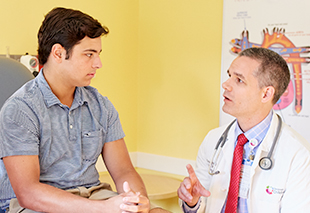New Cardio-Oncology Program Meets a Critical Need

Cardiology and oncology teams have joined together to care for patients who have developed heart issues during or after cancer treatment.
The specialty of cardio-oncology for adults has grown over the past two decades. Now it is also gaining attention in the pediatric and young adult populations.
Cardio-oncology is the sub-specialty field focusing on patients who have been treated for cancer and later develop cardiovascular problems as a result of cancer treatment. This heart-cancer connection was first noticed in adult patients after the widespread use of anthracycline medications in the 1970s.
“Patients who were treated with anthracyclines were later shown to develop symptomatic heart failure at higher rates than expected,” explains cardiologist Thomas D. Ryan, MD, PhD, director of Clinical Operations, Cardiomyopathy and Advanced Heart Failure for the Heart Institute. “In the adult world, physicians quickly realized they needed to watch these patients more closely. The same is true in pediatrics. Children with cancer need closer monitoring of certain cardiovascular conditions.”
Developing a Comprehensive Program
Ryan has long had an interest in this field, and has been seeing such patients for several years, working with oncologist Rajaram Nagarajan, MD, MS, medical director of the Division of Oncology and co-director of the Cancer Survivor Center. In early 2018, they formally launched the Cardio-oncology Program, serving as co-directors. Ryan now sees pediatric, adolescent and young adult patients with a history of cancer or blood diseases who also have cardiac issues in a specialized clinic twice a month.
“This is a unique opportunity for collaboration between cardiologists and oncologists where both sides have expertise,” Nagarajan says. “This program allows us to provide a full continuum of care and a more holistic approach for these patients.”
The program features a team of hematologists, oncologists, stem cell transplant specialists and cardiologists who have interests in the prevention, treatment and particular needs of this patient population. Staying abreast of the current literature, they discuss novel therapies that may have cardiac impacts with the goal of maximizing the health of their patients.
Research an Essential Component
Research plays an important role in the program, with the physicians calling on the expertise of their colleagues from both the Cancer and Blood Diseases Institute and Heart Institute. Their work includes studies looking at predictors of certain heart diseases, correlation of side effects, and prevention strategies. They are also active in working with the American College of Cardiology to build guidelines for this unique patient population.
The addition of this program broadens the spectrum of care provided at Cincinnati Children’s, bringing the benefits of an important emerging specialty to patients.


